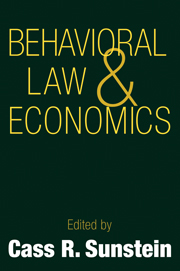Book contents
- Frontmatter
- Contents
- Contributors
- Acknowledgments
- Introduction
- Part I Overview and Prospects
- Part II Heuristics and Biases: Shortcuts, Errors, and Legal Decisions
- 2 Context-Dependence in Legal Decision Making
- 3 A Positive Psychological Theory of Judging in Hindsight
- 4 Behavioral Economics, Contract Formation, and Contract Law
- 5 Organized Illusions: A Behavioral Theory of Why Corporations Mislead Stock Market Investors (and Cause Other Social Harms)
- 6 Reluctance to Vaccinate: Omission Bias and Ambiguity
- 7 Second-Order Decisions
- Part III Valuation: Values and Dollars in the Legal System
- Part IV The Demand for Law: Why Law Is As It Is
- Index
6 - Reluctance to Vaccinate: Omission Bias and Ambiguity
Published online by Cambridge University Press: 05 June 2012
- Frontmatter
- Contents
- Contributors
- Acknowledgments
- Introduction
- Part I Overview and Prospects
- Part II Heuristics and Biases: Shortcuts, Errors, and Legal Decisions
- 2 Context-Dependence in Legal Decision Making
- 3 A Positive Psychological Theory of Judging in Hindsight
- 4 Behavioral Economics, Contract Formation, and Contract Law
- 5 Organized Illusions: A Behavioral Theory of Why Corporations Mislead Stock Market Investors (and Cause Other Social Harms)
- 6 Reluctance to Vaccinate: Omission Bias and Ambiguity
- 7 Second-Order Decisions
- Part III Valuation: Values and Dollars in the Legal System
- Part IV The Demand for Law: Why Law Is As It Is
- Index
Summary
Subjects are reluctant to vaccinate a (hypothetical) child when the vaccination itself can cause death, even when this is much less likely than death from the disease prevented. This effect is even greater when there is a “risk group” for death (with its overall probability held constant), even though the test for membership in the risk group is unavailable. This effect cannot be explained in terms of a tendency to assume that the child is in the risk group. A risk group for death from the disease has no effect on reluctance to vaccinate. The reluctance is an example of omission bias, an overgeneralization of a distinction between commissions and omissions to a case in which it is irrelevant. Likewise, it would ordinarily be prudent to find out whether a child is in a risk group before acting, but in this case it is impossible, so knowledge of the existence of the risk group is irrelevant. The risk-group effect is consistent with Frisch and Baron's interpretation of ambiguity.
The present study concerns the role of two biases in hypothetical decisions about vaccinations. One bias is the tendency to favor omissions over commissions, especially when either one might cause harm. We show that some people think that it is worse to vaccinate a child when the vaccination can cause harm than not to vaccinate, even though vaccination reduces the risk of harm overall.
- Type
- Chapter
- Information
- Behavioral Law and Economics , pp. 168 - 186Publisher: Cambridge University PressPrint publication year: 2000
- 5
- Cited by



